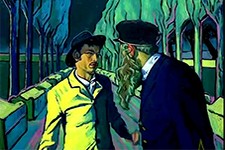Loving Vincent
|  The first thing you are likely to hear about Loving Vincent is that each one of its more than 65,000 individual frames is an actual oil painting on canvas by one of some 115 artists. In fact, it is the very first thing the film itself tells you, which means that much of its importance, or at least its achievement, resides in the fact that it is a moving painting—not metaphorically, or aesthetically, but a literal painting that moves, something that has apparently never been done before in a feature-length film. There have been thousands of hand-drawn animated features that have been inked onto cells, but never before has someone tried to compose a feature-length animated film out of literal paintings. In the era of computer-generated animation, where microprocessors are often as responsible as individual artists for the look of a film, this is something to behold. What are you likely to not hear very much about Loving Vincent is the story, partially because the film’s formal triumph is so astounding and so utterly unique, but also because the narrative is incontrovertibly rote in nature. Written by Dorota Kobiela, Hugh Welchman, and Jacek Dehnel (the first two of whom also directed), Loving Vincent takes the shape of a mystery, with a young man named Armand Roulin (Douglas Booth) attempting to return a letter that the great post-Impressionist painter Vincent van Gogh wrote to his brother Theo, but failed to send before he died of a self-inflicted gunshot wound. When Armand discovers that Theo is dead, as well, he launches his own investigation into Vincent’s death in the French village of Auvers-sur-Oise, which results in a series of relatively static scenes in which Armand talks to various locals, each conversation ending with the suggestion that he go talk to someone else. His main goal is to speak with Dr. Gachet (Jerome Flynn), the homeopathic doctor who was caring for Vincent at the time and with whom he had developed a strong relationship. Unfortunately, the good doctor is out of town for two days, so Armand ends up talking with his stern, moralistic housekeeper Louise (Helen McCrory) and his mysterious daughter Marguerite (Saoirse Ronan), who denies knowing Vincent well even though a local boatman (Aidan Turner) saw them rowing together. Armand gets a great deal of information from Adeline Ravoux (Eleanor Tomlinson), the daughter of the proprietor of the local inn where Vincent was living and where he succumbed to his injuries. The more Armand talks with the villagers who knew and interacted with Vincent, the more questions arise, eventually leading to the big one: Did Vincent actually commit suicide or was he shot by someone else? (This is a recently raised issue, first appearing in a 2011 biography by Steven Naifeh and Gregory White.) There are questions about the gun that was used and where he was shot (a field or a barn?), as well as unresolved issues about his various relationships. Another doctor named Père Tanguy (John Sessions), who attended to Vincent’s wound, claims that the angle of the bullet could not possibly indicate a self-inflicted gunshot. There are attempts to make all of this suspenseful and intriguing, but it rarely rises to that level, instead settling on a plateau of middling interest. You get the sense that the filmmakers are trying to make Vincent’s death into a late 19th-century variation on the JFK assassination, with multiple conflicting accounts and suspicious official conclusions, but it feels mostly like watching a series of beautifully painted conversations. Which, of course, brings us back to the film’s look, which is really what it is all about. Loving Vincent, as the title suggests, is deeply enamored with the groundbreaking painterly style developed by Vincent van Gogh in the last years of his life, during which he churned out more than 800 paintings, only one of which actually sold while he was alive. Van Gogh is the quintessential misunderstood genius, the starving artist par excellence, the great exemplar of the crossroads of mental illness and artistry, and the film depicts him as a victim who was despised by the snobby villagers, hounded by drunken teenagers, and dismissed by almost everyone who should have recognized his incipient greatness. We see him in flashbacks, all of which are rendered in grayscale paintings that lean more toward the detailed realism that characterized van Gogh’s early work, rather than the rest of the film, which adopts the bold colors and broad brush strokes that characterized his later, more influential style. The merging of van Gogh’s life with his painterly aesthetic is intriguing, although it doesn’t do much to merge form and content, as Richard Linklater did so brilliantly in his philosophical dreamscape Waking Life (2001); one could imagine the film working just as well as a live-action film (the paintings were all rotoscoped, so they maintain a lifelike sense of movement in the human characters even as the world around them shifts and swirls like a van Gogh come to life). Watching Loving Vincent is a dazzling aesthetic experience in its own right, but it’s hard to escape the feeling that it is ultimately just a gimmick, drawing us into an underwhelming story by promising a feast for the eyes. Copyright © 2017 James Kendrick Thoughts? E-mail James Kendrick All images copyright © Good Deeds Entertainment |
Overall Rating: 

 (2.5)
(2.5)


